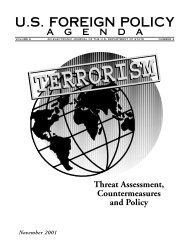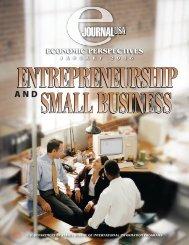s. history us history us history - Embassy of the United States
s. history us history us history - Embassy of the United States
s. history us history us history - Embassy of the United States
- No tags were found...
Create successful ePaper yourself
Turn your PDF publications into a flip-book with our unique Google optimized e-Paper software.
CHAPTER 4: THE FORMATION OF A NATIONAL GOVERNMENTIn <strong>the</strong> Appalachian region, <strong>the</strong> revival took on characteristics similarto <strong>the</strong> Great Awakening <strong>of</strong> <strong>the</strong> previo<strong>us</strong> century. But here, <strong>the</strong> center <strong>of</strong> <strong>the</strong>revival was <strong>the</strong> camp meeting, a religio<strong>us</strong> service <strong>of</strong> several days’ length, fora group that was obliged to take shelter on <strong>the</strong> spot beca<strong>us</strong>e <strong>of</strong> <strong>the</strong> distancefrom home. Pioneers in thinly populated areas looked to <strong>the</strong> camp meetingas a refuge from <strong>the</strong> lonely life on <strong>the</strong> frontier. The sheer exhilaration <strong>of</strong>participating in a religio<strong>us</strong> revival with hundreds and perhaps tho<strong>us</strong>ands<strong>of</strong> people inspired <strong>the</strong> dancing, shouting, and singing associated with <strong>the</strong>seevents. Probably <strong>the</strong> largest camp meeting was at Cane Ridge, Kentucky, inAug<strong>us</strong>t 1801; between 10,000 and 25,000 people attended.The great revival quickly spread throughout Kentucky, Tennessee, andsou<strong>the</strong>rn Ohio, with <strong>the</strong> Methodists and <strong>the</strong> Baptists its prime beneficiaries.Each denomination had assets that allowed it to thrive on <strong>the</strong> frontier. TheMethodists had a very efficient organization that depended on ministers —known as circuit riders — who sought out people in remote frontier locations.The circuit riders came from among <strong>the</strong> common people and possessed arapport with <strong>the</strong> frontier families <strong>the</strong>y hoped to convert. The Baptists hadno formal church organization. Their farmer-preachers were people whoreceived “<strong>the</strong> call” from God, studied <strong>the</strong> Bible, and founded a church, which<strong>the</strong>n ordained <strong>the</strong>m. O<strong>the</strong>r candidates for <strong>the</strong> ministry emerged from <strong>the</strong>sechurches, and established a presence far<strong>the</strong>r into <strong>the</strong> wilderness. Using suchmethods, <strong>the</strong> Baptists became dominant throughout <strong>the</strong> border states andmost <strong>of</strong> <strong>the</strong> South.The Second Great Awakening exercised a pr<strong>of</strong>ound impact on American<strong>history</strong>. The numerical strength <strong>of</strong> <strong>the</strong> Baptists and Methodists rose relativeto that <strong>of</strong> <strong>the</strong> denominations dominant in <strong>the</strong> colonial period — Anglicans,Presbyterians, and Congregationalists. The growing differenceswithin American Protestantism reflected <strong>the</strong> growth and diversity <strong>of</strong> anexpanding nation.Andrew Jackson, president from 1829 to 1837. Charismatic, forceful,and passionate, Jackson forged an effective political coalition within<strong>the</strong> Democratic Party with Westerners, farmers, and working people.TRANSFORMINGA N A T I O NA P I C T U R E P R O F I L EThe <strong>United</strong> <strong>States</strong> transformed itself again in <strong>the</strong> 19th andearly 20th centuries. A rural, agricultural nation became anind<strong>us</strong>trial power whose backbone was steel and coal, railroads,and steam power. A young country once bound by <strong>the</strong> MississippiRiver expanded across <strong>the</strong> North American continent, and on tooverseas territories. A nation divided by <strong>the</strong> issue <strong>of</strong> slavery andtested by <strong>the</strong> trauma <strong>of</strong> civil war became a world power whoseglobal influence was first felt in World War I.88 89












